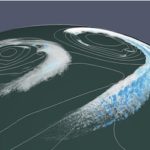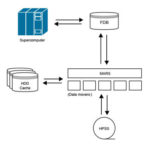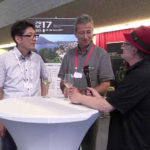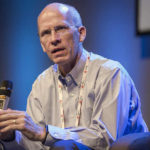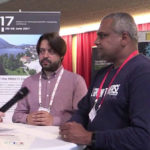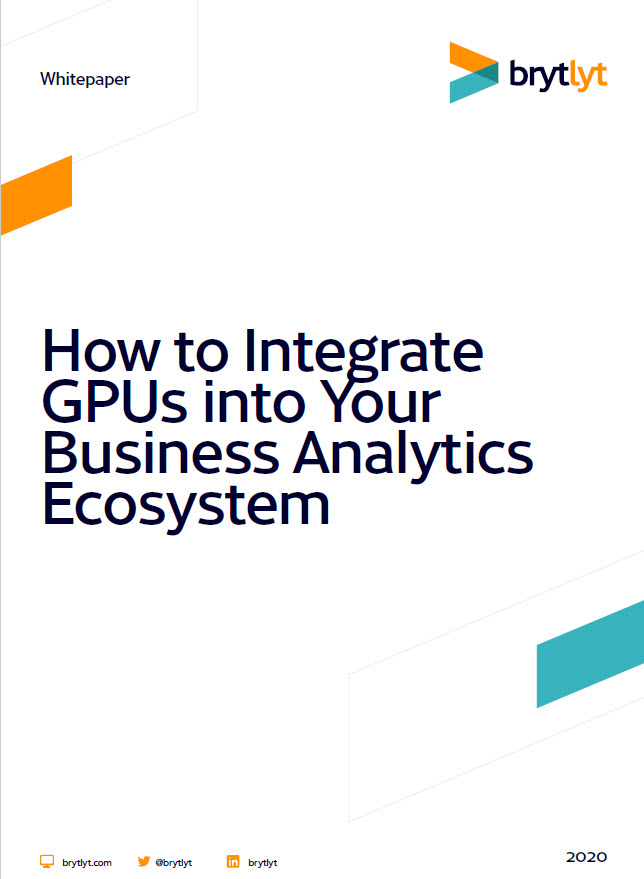A new peer-reviewed paper is reportedly causing a stir in the climatology community. “The best hope for reducing long-standing global climate model biases, is through increasing the resolution to the kilometer scale. Here we present results from an ultra-high resolution non-hydrostatic climate model for a near-global setup running on the full Piz Daint supercomputer on 4888 GPUs.”
A Scalable Object Store for Meteorological and Climate Data
Simon D. Smart gave this talk at the PASC17 conference. “Numerical Weather Prediction (NWP) and Climate simulations sit in the intersection between classically understood HPC and the Big Data communities. Driven by ever more ambitious scientific goals, both the size and number of output data elements generated as part of NWP operations has grown by several orders of magnitude, and will continue to grow into the future. This poses significant scalability challenges for the data processing pipeline, and the movement of data through and between stages is one of the most significant factors in this.”
Video: Towards Quantum High Performance Computing
“Following an introduction to the exceptional computational power of quantum computers using analogies with classical high performance computing systems, I will discuss real-world application problems that can be tackled on medium scale quantum computers but not on post exa-scale classical computers. I will motivate hardware software co-design of quantum accelerators to classical supercomputers and the need for educating a new generation of quantum software engineers with knowledge both in quantum computing and in high performance computing.”
Interview: The Computational Challenges of Fusion Energy
In this video from PASC17, Yasuhiro Idomura from the Japan Atomic Energy Agency and Laurent Villard from EPFL discuss the computational challenges of developing Fusion reactors. “Numerical plasma physics models are used to improve our understanding of transport, instability growth and other poorly understood phenomena encountered in the experimental devices edging toward viable fusion energy. Since computational expense imposes a major limitation on accurate physical modeling, computational resources must be used as efficiently as possible.”
Panel Discussion: Sustainable Software Development in Computational Sciences
“PASC has recently formed collaborative partnerships with a number of scientific journals. In this panel discussion, representatives from these journals are invited to express their thoughts regarding publication practices in the computational sciences, including the publication of software codes. How can we validate published results and guarantee reproducibility? Finally, we will describe our vision for the PASC papers initiative going forward.”
Exaflow: Collaborating on the Computational Challenges of CFD
“Fluid Dynamics (FD) simulations provide a powerful tool for the analysis of such fluid flows and are an essential element of many industrial and academic problems. The complexities and nature of fluid flows, often combined with problems set in open domains, implies that the resources needed to computationally model problems of industrial and academic relevance is virtually unbounded.”
Open Science with OpenPMD
“We present the open meta data format openPMD for data format agnostic markup of particle-mesh data. Based on a minimal kernel of meta information and enriched with domain-specific extensions, we develop an open ecosystem of interoperable simulations and data processing frameworks from the domains of laser-plasma interaction, X-ray photon sciences, astrophysics up to systems biology. This poster presents our efforts to enable & establish workflows suitable to frictionless transposition between those domains, using highly scalable I/O methods (e.g. ADIOS BP or HDF5), a truly self-describing data markup and peer reviewed participation.”
Interview: Dr. Christoph Schär on Escaping the Data Avalanche for Climate Modeling
“There are large efforts towards refining the horizontal resolution of climate models to O(1 km) with the intent to represent convective clouds explicitly rather than using semi-empirical parameterizations. This refinement would move the governing equations closer to first principles and is expected to reduce the uncertainties of climate models. However, the output volume of climate simulations would dramatically grow, and storing it for later analysis would likely become impractical, due to limited I/O bandwidth and mass-storage capacity. In this presentation we discuss possible solutions to this challenge.”
Video: Computational Discovery in the 21st Century
Nicola Marzari from EPFL gave this public lecture at PASC17. “The talk offers a perspective on the current state-of-the-art in the field, its power and limitations, and on the role and opportunities for novel models of doing computational science – leveraging big data or artificial intelligence – to conclude with some examples on how quantum simulations are accelerating our quest for novel materials and functionalities.”
Video: Flash Poster Session at PASC17
In this video from PASC17, Maria Grazia Giuffreda (ETH Zurich / CSCS, Switzerland) moderates a Flash Poster Session. “The aim of this session is to allow poster presenters to introduce the topic of their poster and motivate the audience to visit them at the evening poster session. Authors will be strictly limited to 40 seconds each – after this time the presentation will be stopped automatically.”

